Events
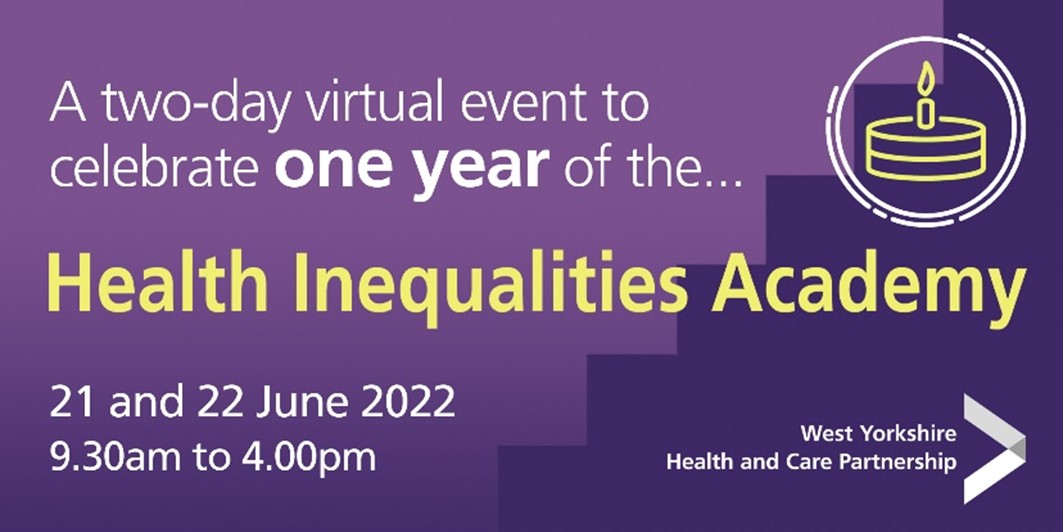 Health Inequalities Academy - one year on
Health Inequalities Academy - one year on
On 21 and 22 June 2022 we held a two-day virtual event to celebrate one year of the Health Inequalities Academy. Following the successful launch of the Health Inequalities Academy in February 2021 the virtual event brought partners together to explore our progress to date, share learning, and outline our continued approach toward closing the health and wellbeing gap across West Yorkshire.
For more information see our Health Inequalities Academy one-year on news page.
We had a fantastic range of speakers lined up. See the Health Inequalities event broucher 2022 for a list of all the speakers and workshops. Register on the eventbrite pages before Thursday, 16 June 2022. Please email valerie.
Resources from the Health Inequalities Academy one-year on event
In this section you can see the presentations and recordings from the one year on event held on 21 and 22 June 2022.
Day 1 - 21 June 2022 recordings
Day 1 workshops
Day 1 presentations and other resources
If the presentation you want is not on this page or is not accessible to meet your needs please let us know by emailing valerie.mzizi@
- Introduction - recap and context by Dr Sohail Abbas, Director, Reducing Inequalities Alliance, Bradford district and Craven. Dr Abbas provides a recap of the objectives of the Health Inequalities Academy
- Improving system capability by Joan Saddler OBE – Director of Partnerships and Equality, NHS Confederation
- Health inequalities grant funding: programme and evaluation by Matt Greensmith – Public Health Registrar, Health Education England Yorkshire & Humber. Matt's presentation also included showcasing: an evaluation postcode finder tool to enable voluntary and community sector colleagues to successfully target those who will benefit the most.
- Solace - promoting emotional well-being for refugees and asylum seekers in Kirklees video resource
- Growing Focal, based at Focal Community Centre in Huddersfield, is doing its bit to tackle climate change, help wildlife and pollinators, and transform people’s physical and mental wellbeing. See our video to catch up with Lisa, Chrissie and the Growing Focal team to find out the crucial role the project has played and continues to play in the local community
-
The Voluntary Community and Social Enterprise (VCSE) sector - Jo-Anne Baker, Programme Director for Harnessing the Power of Communities discusses the vital role of the VCSE sector in tackling inequalities and some of the ongoing work
Workshop 1 - housing for health
- Bringing together healthcare, affordable warmth and housing services for children and young people with asthma by Dr Claire Gilbert, Public Health Registrar, Yorkshire and Humber
- Smart Health Inclusion Peer Advocacy (SHIPS) - update by Ozal Hakki
- #HealthNow West Yorkshire research findings - understanding homeless health inequality in Calderdale, Kirklees and Wakefield by Rachel Brennan, National Partnerships Lead, Groundswell
Workshop 2 - adversity, trauma and resilience
See recording
Workshop 3 - Health Equity Fellowship Programme
Why I applied for the fellowship by Emma Pears, Chief Officer, SELFA
Day 2 - 22 June 2022 recordings
Day 2 presentations and other resources
- Welcome back to day 2 - by Emmerline Irving, Senior Programme Manager for Improving Population Health, West Yorkshire Health and Care Partnership
- Our journey to be a partnership of sanctuary video
- Bradford Reducing Inequalities in Communities (RIC) by Duncan Cooper, Public Health Consultant; Assistant Director Reducing Inequalities Alliance, NHS Bradford District and Craven CCG - how to build a local inequalities alliance
- Our approach to reducing inequalities in central Bradford, by Sophie DiMauro, Reducing Inequalities Communications and Engagement Manager, NHS Bradford District and Craven Clinical Commissioning Group. The Bradford RIC Team shares how they are taking a population health management approach to close the health gap seen across the Bradford District and Craven place
- Recap, looking ahead and role of 'I' by Dr Sohail Abbas - Director, Reducing Inequalities Alliance, Bradford district and Craven; Chair, West Yorkshire Health Inequalities Network; Deputy Chair, Bradford Wellbeing Board; GP Partner, Kensington Partnership.
Sohail closed the event discussing what is the “I” in inequality and we can all continue to tackle health inequalities through our specific actions
Workshop 4 - how to build a local inequalities alliance
Workshop 5 - Core20PLUS5 - learning from other places
Workshop 6 - digital inequalities
See recording
Workshop 7 - Core20PLUS5 community connectors - migrant health
See recording
Workshop 8 - Core20PLUS5 Community Connectors - Leeds GATE
See recording
Workshop 9 - making young carers visible
See recording
Day 2 workshops
Health inequalities funding showcase event 29 September 2021
Last Summer, we awarded a total of £500,000 in health inequality grant funding to 13 voluntary and community groups. This funding was used to facilitate a diverse range of projects hosted by community organisations, working in partnership with local health providers, all of whom represented areas which had been disproportionately affected by the COVID pandemic.
We are delighted to announce that, on 29 September we are holding a full day event to showcase the successes of these innovative projects, delivered by communities, for communities. There will be lots of opportunities to share good practice and we know you will be inspired by the stories from our grant funded projects. These range from Dementia Friendly Keighley – supporting people living with dementia and their carers, to The Thornbury Centre, Bradford – delivering befriending support for people aged 55 and over from South Asian, refugee and Eastern European Roma populations to GIPSIL, Leeds – supporting young people in transition from children’s to adult’s mental health services.
We’d love to see you join us on 29 September to help us celebrate the success of these initiatives. If you have any questions in the meantime, please do not hesitate to contact Paula Sherriff at paula.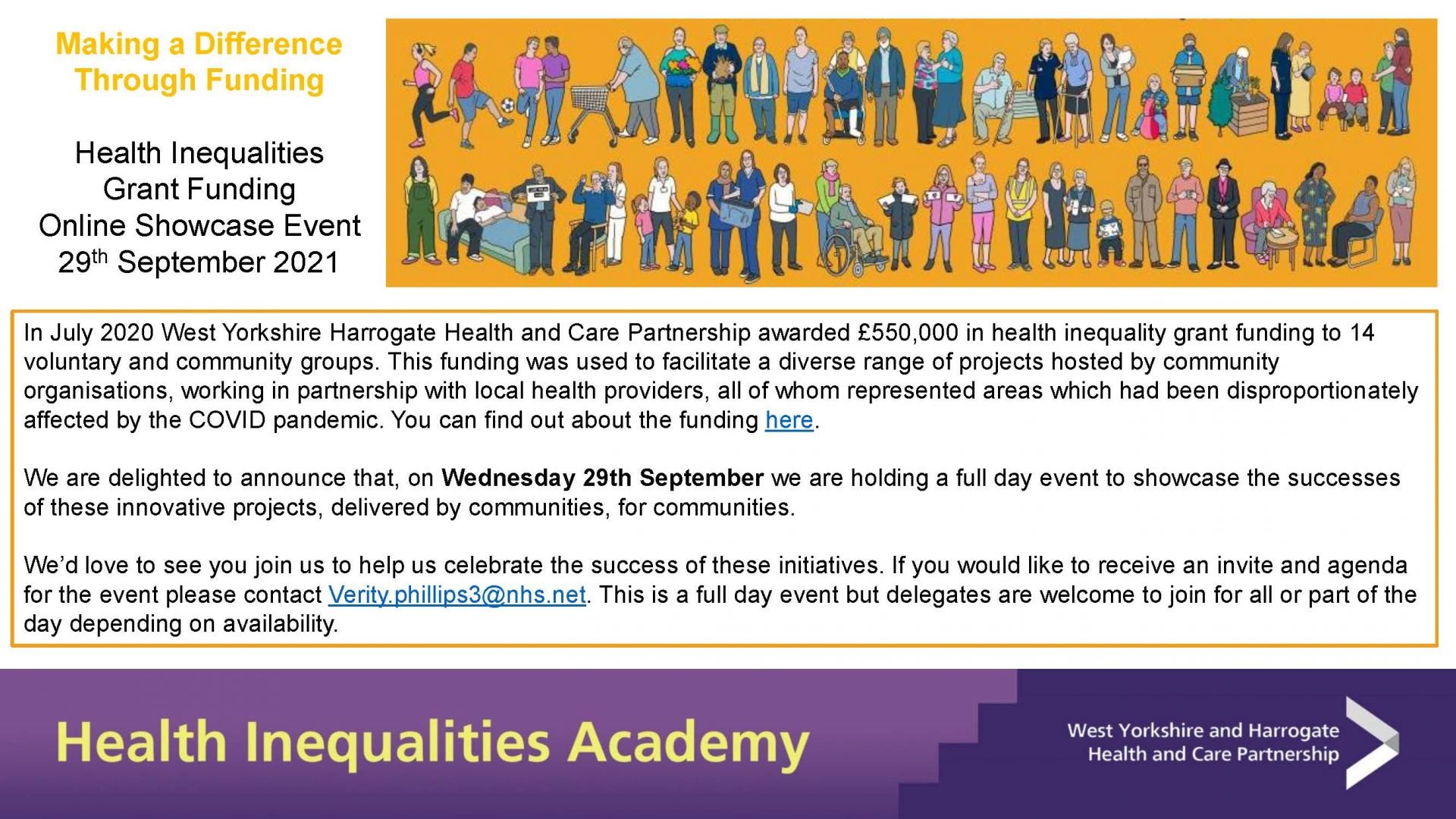
Health Inequalities Academy Launch Event: 3-5 February 2021
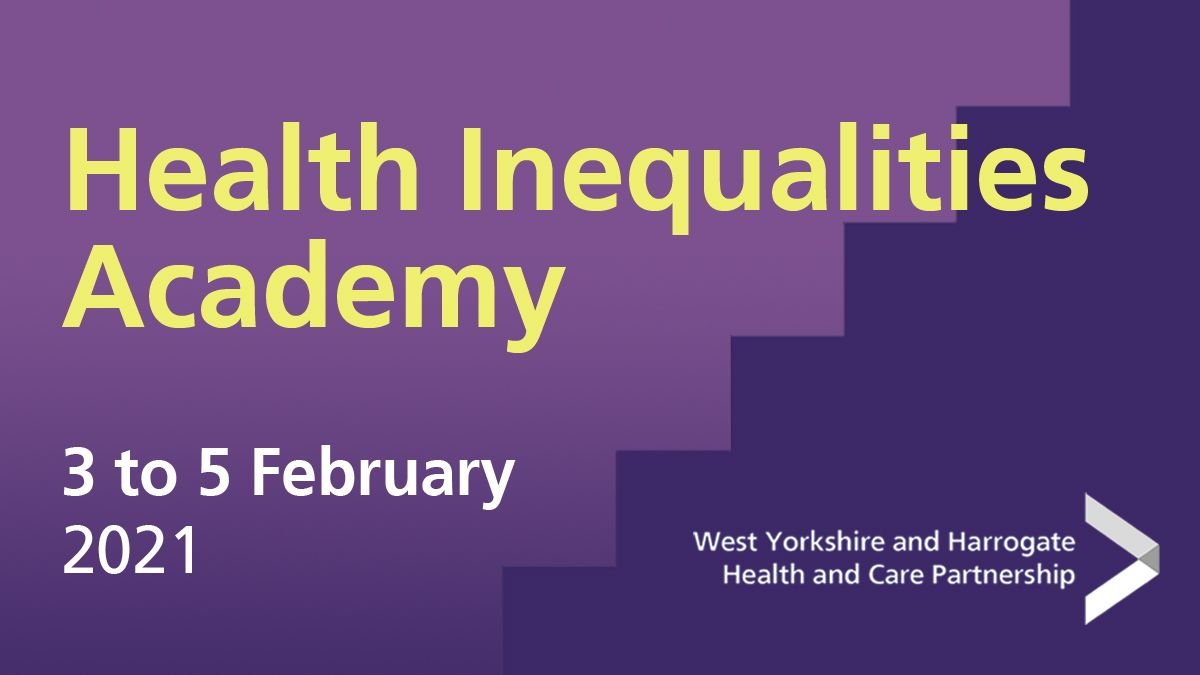 Over 400 colleagues from across the area and beyond took part in the Health Inequalities Academy launch which took place from 3 to 5 February 2021. The event provided the opportunity to hear from a stellar line-up of regional and national experts about the work taking place, before and during Covid-19, to address health inequalities.
Over 400 colleagues from across the area and beyond took part in the Health Inequalities Academy launch which took place from 3 to 5 February 2021. The event provided the opportunity to hear from a stellar line-up of regional and national experts about the work taking place, before and during Covid-19, to address health inequalities.
Day 2 of the event also included the launch of the Reducing Inequalities in Communities Programme, a collaborative approach to closing the health gap in central Bradford.
“An amazing session, very insightful and informative. The videos were fab! Great to hear about evidence based local interventions that are truly making a difference,” - event attendee.
The Health Inequalities Academy brought together learning, experiences and plans for further action to be delivered by the health, care, community and voluntary services organisations that make up the partnership. We’ll publish more details about that work soon. For example, on day three we were joined by The Health and Care Champions, a group of adults with disabilities who work with us to discuss health inequalities and create change within health care organisations.
The commitment of influential national and regional leaders to our Health Inequalities Academy event was confirmation of how serious these issues are. As a health and care system we have a number of big ambitions for addressing inequalities and we will use our enhanced knowledge about the people who have been disproportionately affected through the COVID-19 pandemic to build robust plans for interventions that will help us take them beyond the current crisis and into a better future.
There's more information about the launch in our post-event handbook and the amazing line-up of guest speakers and presenters, in our Health Inequalities Academy launch event programme. Here are some of the presentations from each day.
Day 1
Day 2
- Day 2: introduction - Cllr Tim Swift
- Day 2: breakout session - CCGs
- Day 2: breakout session - community pharmacy
- Day 2: breakout session - housing
- Day 2: breakout session - mental health
- Day 2: breakout session - mental health 2
- Day 2: breakout session - climate change
- Day 2: breakout session - healthy hospitals
- Day 2: breakout session - VCSE
- Day 2: health inequalities action and framework - Chris Bentley
- Day 2: Reducing Inequalities in Communities presentations
Day 3
- Day 3: introduction - Rob Webster
- Day 3: breakout session - gypsy traveller population
- Day 3: breakout session - migrant health
- Day 3: breakout session - Nelson talks about his experiences of migrant health video
- Day 3: breakout session - LGBTQ+
- Day 3: breakout session - unpaid carers
- Day 3: breakout session - inequalities by ethnicity
- Day 3: breakout session - learning disability
- Day 3: breakout session - violence and inequalities
- Day 3: digital inclusion - Hannah Davies, Roz Davies and Dawn Greaves
- Day 3: academy take-off
Your pledges
Here's all the pledges that people attending made following the event.
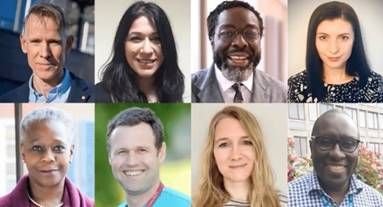 Guest speakers included:
Guest speakers included:
- Robin Tuddenham - Co-chair of our Improving Population Health Programme
- Dr James Thomas - Co-chair of our Improving Population Health Programme
- Sarah Muckle - Director of Public Health, Bradford
- Dr Owen Williams - OBE CEO for Calderdale and Huddersfield NHS Foundation Trust
- Alison Lowe - CEO for Touchstone Leeds and Non-Executive Director at Leeds Community Health Care NHS Trust
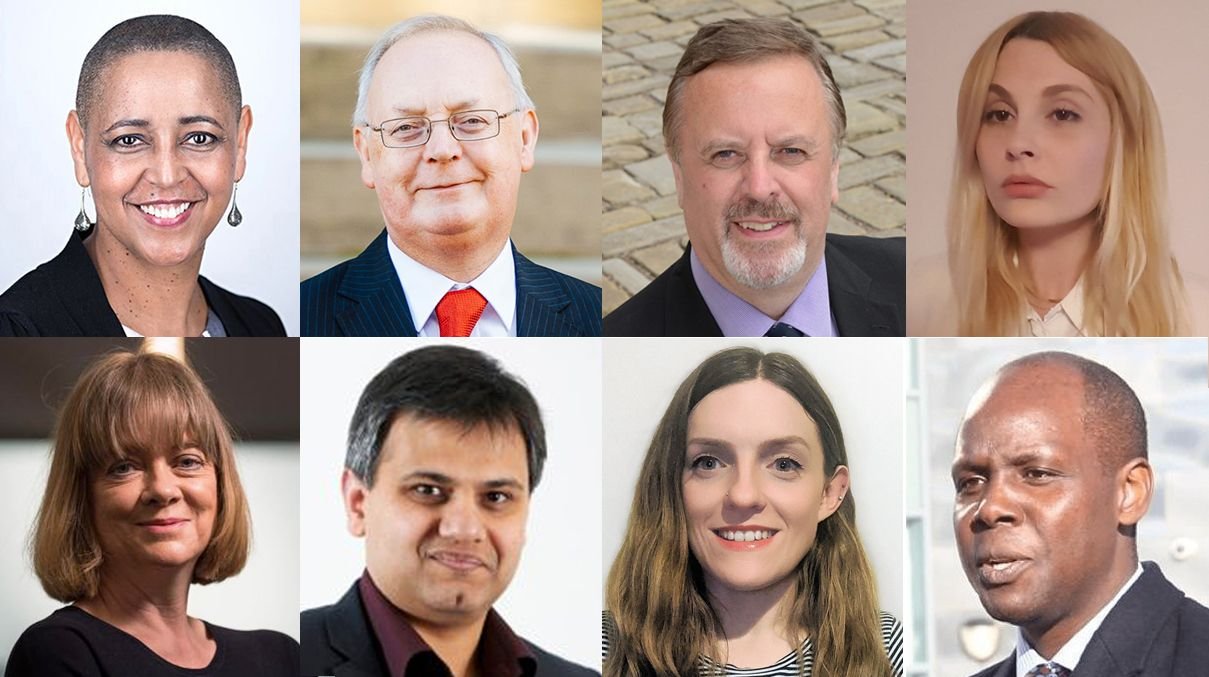 Lord Victor Adebowale - Chair, NHS Confederation
Lord Victor Adebowale - Chair, NHS Confederation- Professor Dame Donna Kinnair - CEO, the Royal College of Nursing
- Professor John Wright - Bradford Institute of Health Research
- Pip Goff - Volition Director and VCSE representative for Improving Population Health
- Professor Kate Pickett - Professor of Epidemiology, Deputy Director of the Centre for Future Health, University of York
- Emily Parry-Harries - Consultant in Public Health, Kirklees Council and Chair of West Yorkshire and Harrogate Prevention Network
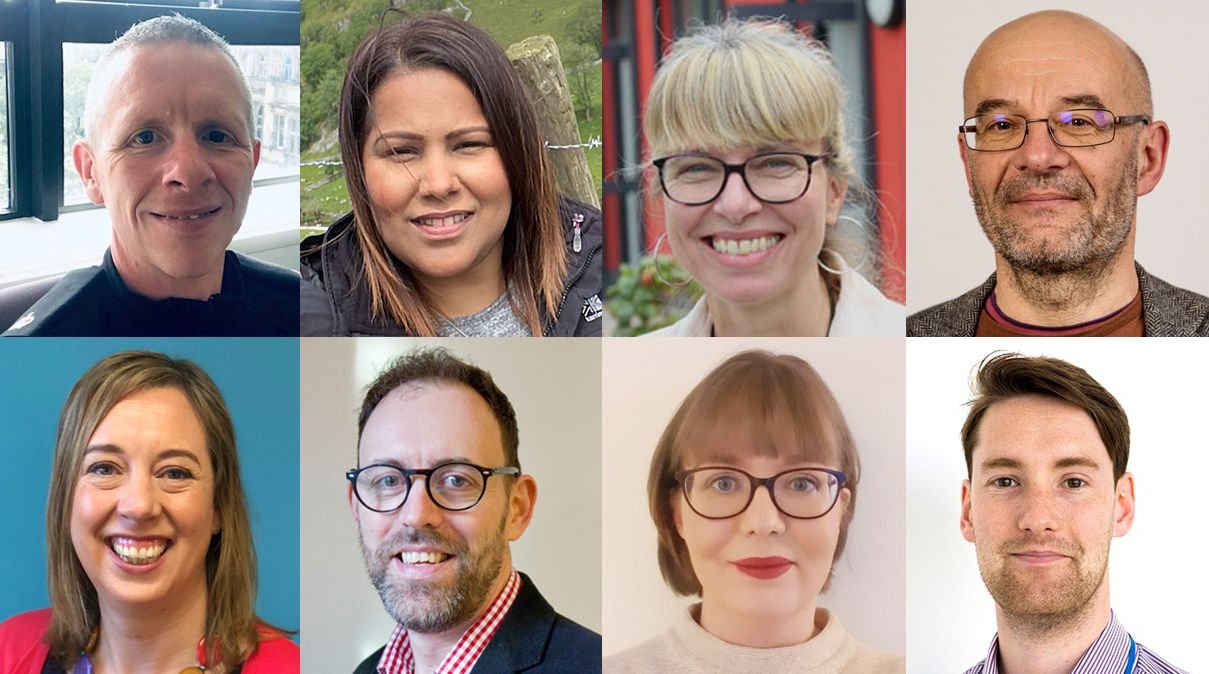 Professor Chris Bentley - Equity and Health Inequalities Teams of Public Health England and NHS England/Improvement
Professor Chris Bentley - Equity and Health Inequalities Teams of Public Health England and NHS England/Improvement- Professor Edward Kunonga - Consultant in Public Health, County Durham and Darlington NHS Foundation Trust;
- Tees Esk and Wear Valley NHS Mental Health NHS Foundation Trust
- Dr Sohail Abbas - Chair of West Yorkshire and Harrogate Health Inequalities Network
- Professor Mark Gamsu - School of Health and Community Studies, Leeds Beckett University
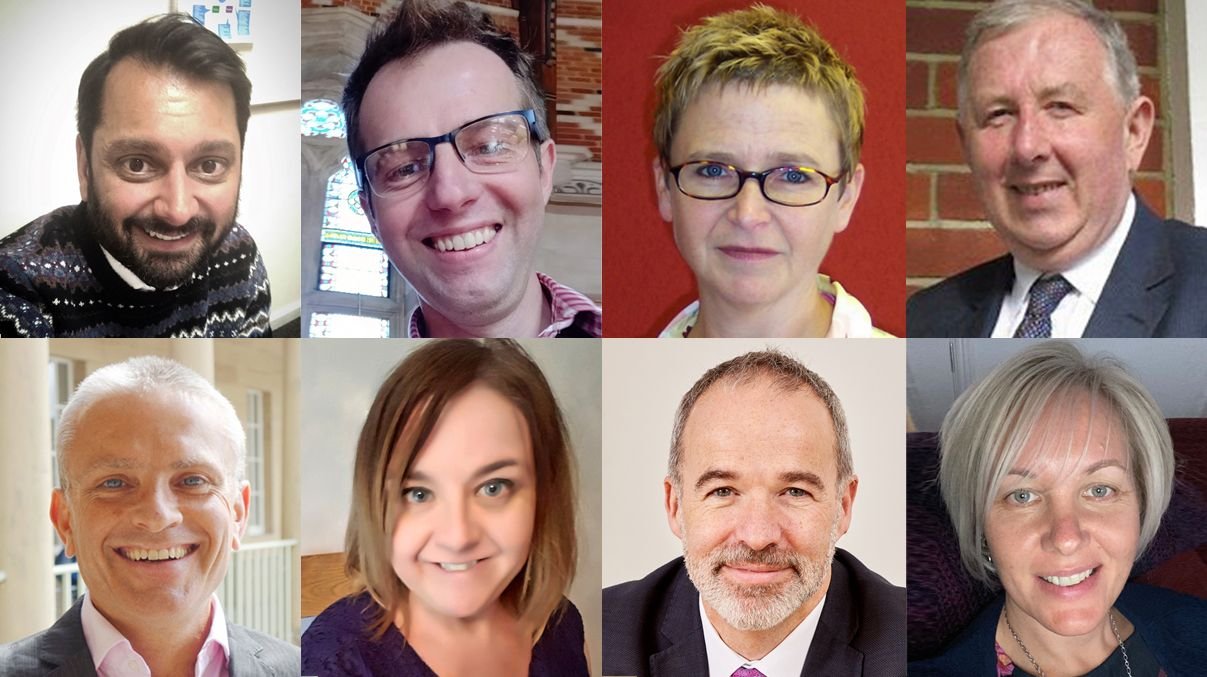 Toni Williams - Consultant in Public Health, Deputy Director Health and Wellbeing, Public Health England, Yorkshire and Humber
Toni Williams - Consultant in Public Health, Deputy Director Health and Wellbeing, Public Health England, Yorkshire and Humber- Dr Shahed Ahmad - National Clinical Director, Cardiovascular Disease Prevention, NHS England
- Mark Burns-Williamson OBE - Police and Crime Commissioner for West Yorkshire
Guest blog
 Let’s talk about anchor institution principles - John Ebo, Acting Assistant Director, Improving Population Health Team
Let’s talk about anchor institution principles - John Ebo, Acting Assistant Director, Improving Population Health Team
The role of our partnership as an anchor system is crucial in tackling health inequalities and this is why we must embrace this concept as our chosen way of working.
The words of my economics lecturer back in the day rings in my ears till this day. To make your exam thesis stand out, “Keep It Simple, Stupid”, Mr. Ebo!
So, this acronym KISS very much became my watch word when trying to get across the complexity of a topic. It has always struck me as rather odd that when we lead on important work in our partnership, we tend to take the “simple” and make it the “complicated”. The more complicated we can make it, the grander it can sound, further increasing the gap of understanding between us and the populations we serve.
Strategies, visioning, mission, outputs, outcomes, action plans are all important of course, but the way in which we pull them together, explain them and most importantly deliver on them is far more important to our patients and populations than anything else we do. The only way to successfully deliver better health for everyone to its full potential is to work together across our system, sectors, places, and expertise to bring the powerful impact of our system to bear on our wicked issues. We already work in true partnership in our system. That much is true and not up for debate.
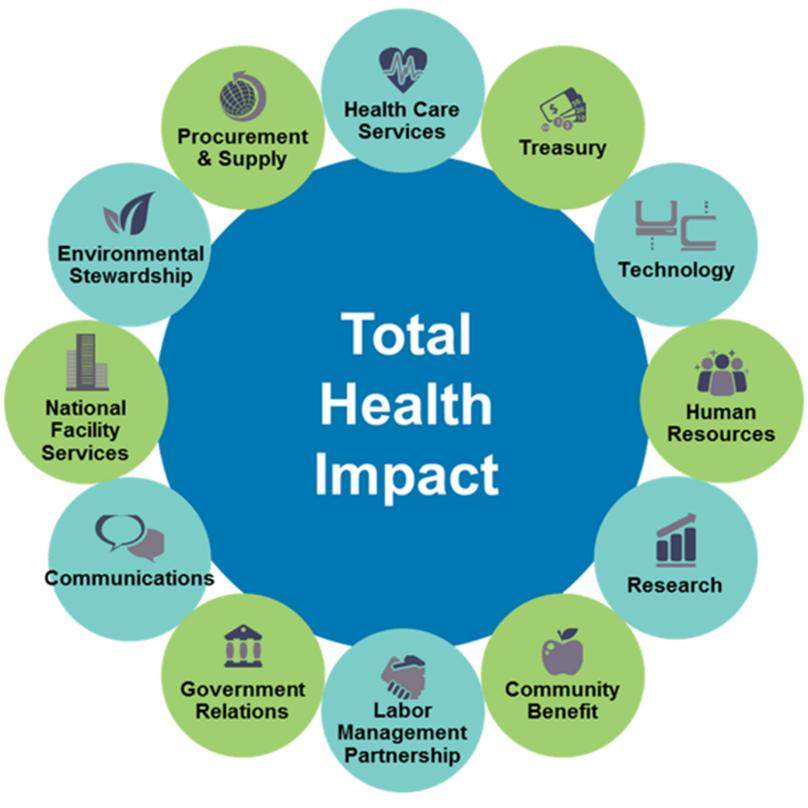 Anchor institution principles however, present the added opportunity to go beyond partnership working. We can go much further onto a new plane of deliberate and proactive focus. It enables collaboration on specific challenges that we face, particularly seen through the lens of health inequalities, which must be our ultimate ambition, right? It means that we can take a full and holistic view of problem solving.
Anchor institution principles however, present the added opportunity to go beyond partnership working. We can go much further onto a new plane of deliberate and proactive focus. It enables collaboration on specific challenges that we face, particularly seen through the lens of health inequalities, which must be our ultimate ambition, right? It means that we can take a full and holistic view of problem solving.
So, let’s go back to my old economics lecturer and his KISS acronym. What do I mean by the need to work as an anchor system in West Yorkshire and Harrogate?
Put simply, it is partnership working on steroids. It is pooling our assets, be that financial or people, our influence, our estates, our ideas to tackle a specific challenge. It is the collective power of our large public sector organisations which are rooted in place and connected to our communities. Our universities, local authorities, hospitals, and community institutions are strong entities individually but imagine what we can achieve collectively when focusing on a specific challenge?
Imagine harnessing our economic buying power across the system on procuring services, or the value we can add to local employment by supporting local supply chains? Or investing specifically in employment programmes targeted at our young people in our places to enable health and care sector career paths, to the benefit of our system and our populations?
The point is we have significant assets and spending power and can consciously use these resources to benefit communities, thereby improving health, addressing inequalities, creating economic opportunities, environmental benefits and social value led outcomes. The fact is that these connections have always existed. Recovery out of the pandemic now gives us a unique window of opportunity to truly become a partnership of anchor institution principles to enable us to influence wider health determinants and build back fairer.
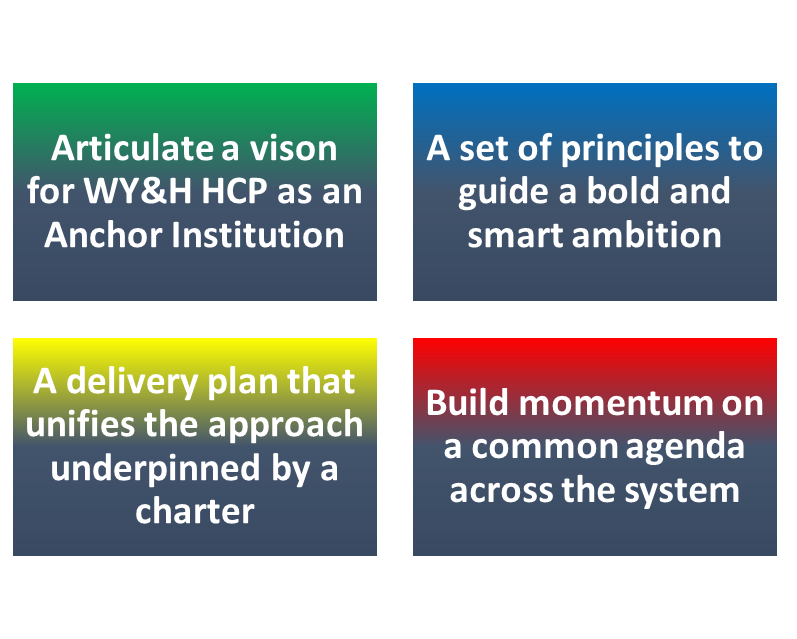 On our Improving Population Health Programme we are working towards this by supporting a value-based healthcare system, our health inequalities academy, adversity trauma and resilience system work, and the broad nature of actions delivered under our climate change strategy. Our links to the mayoral authority on economic recovery in the region are strong and we are evolving as an ICS of sanctuary focusing on migrant communities. Good work is also ongoing on wider determinants of health particularly in housing, and we are supporting many local organisations rooted in the community to deliver social prescribing solutions. Phew! let me catch my breath!
On our Improving Population Health Programme we are working towards this by supporting a value-based healthcare system, our health inequalities academy, adversity trauma and resilience system work, and the broad nature of actions delivered under our climate change strategy. Our links to the mayoral authority on economic recovery in the region are strong and we are evolving as an ICS of sanctuary focusing on migrant communities. Good work is also ongoing on wider determinants of health particularly in housing, and we are supporting many local organisations rooted in the community to deliver social prescribing solutions. Phew! let me catch my breath!
The important thing here is that it’s all about collaborative, focused and good outcomes. West Yorkshire and Harrogate is achieving results on this agenda and the chart at the side is our value proposition on the journey to formalising an anchor system, a way of working that we can all sign up to.
Let’s keep it simple, uncomplicate it and do what we do best. Committed and deliberate actions to deliver good outcomes in redressing health inequalities in our places, together.
So, let’s talk anchors and do get in touch if you wish to continue the conversation on how we can do this. Thank you.
John Ebo
Guest blog
Frank Swinton, Climate Change Lead
I was recently at a seminar about migrant health and one of the attendees asked what I was doing there. “What does climate change have to do with migrant health? The two are unrelated”. I replied that I thought the two were profoundly related but the link clearly wasn’t obvious to everyone so I thought I would walk through the situation as I see it.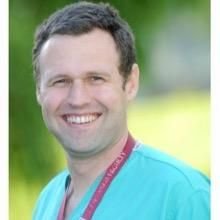
Climate change is caused by human activity, largely, but not exclusively, through the burning of fossil fuels. As the climate changes, we are seeing more periods of extreme weather such as flooding, drought, heatwaves and storms. If people live in areas that are susceptible to extreme weather events or where the land is marginal for growing things anyway, then eventually, they are likely to be forced to leave their homes in search of more stability. Those people are, by definition, migrants. They might be people leaving East Africa because of crop failures or they might be people leaving Lincolnshire because of sea level rise leading to flooding of their homes or salinisation of farmland.
Migrants will travel to other areas of their county or to other countries and that travel will have an environmental impact. It might be burning fossil fuels to travel, eating food that is plastic wrapped to prolong its shelf life, or it might be leaving useful items behind which then need to be re-purchased in the new place.
Once the migrants settle in their new home, they will increase the population density in that place. The relationship between climate change and population density is a complex one with costs and benefits on both sides. It is easier to provide food and services to people who live in cities and towns but people who live in more urban environments tend to consume more and are further removed from the environment so they don’t tend to value it as much because it is not as visible to them. What is more, as population density increases, buildings tend to be higher leading to increased use of cement and steel, both of which are very carbon intensive, to build more homes for the migrants to live in.
All of these increases in carbon further fuel climate change leading to more extreme weather and more sea level rise. If these changes happen very quickly, in countries with less than robust social safety nets, or in areas where there are tensions between ethnic groups then conflict can quickly erupt and conflict is a powerful accelerant of climate change because you have even more people displaced and huge amounts of equipment used to destroy infrastructure. That infrastructure needs to be replaced eventually and/or it further fuels migration which further fuels climate change. It’s a vicious circle in every sense of the term.
So what can we do? First and foremost we can understand that migration and climate change are deeply interlinked and that we cannot resolve one without resolving the other. Then we can start to do whatever we can to reduce our environmental impact and to support migrants. That might be eating less meat, flying less, choosing to speak to the people who have recently arrived in our community to make them feel welcome or writing to our MP to urge action on both migration and climate change. There are lots of inspiring projects out there and I hope that this blog has inspired you to take some action, no matter how small.

